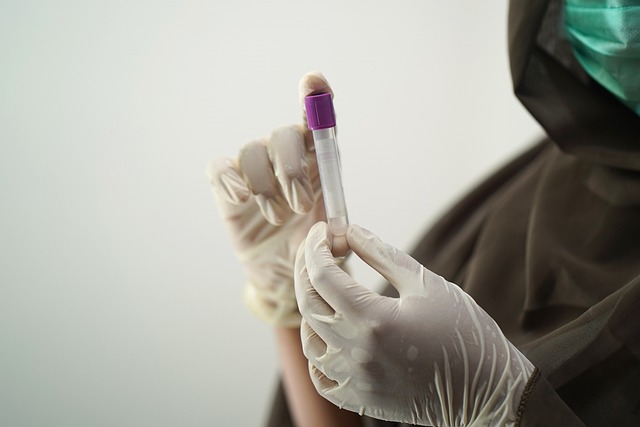In the UK, maintaining optimal cardiovascular health is paramount, and regularly monitoring cholesterol levels through a lipid profile blood test—commonly known as a cholesterol blood test UK—is key. This test measures total cholesterol, HDL (good) cholesterol, and triglycerides, with individuals over 40 or those with cardiovascular disease risk factors advised to undergo this test. The NHS provides guidelines for target cholesterol levels, emphasizing an ideal total cholesterol below 5 mmol/L and LDL (bad) cholesterol below 3 mmol/L. At-home cholesterol testing kits now offer a convenient and private method for monitoring these levels, reducing wait times and empowering patients to make timely health decisions. These kits are particularly beneficial for those with busy schedules or limited mobility. Additionally, lifestyle adjustments such as diet, exercise, and avoiding tobacco use can help manage cholesterol levels. If necessary, medications like statins may be prescribed. The at-home cholesterol blood test UK is a significant innovation in the NHS's commitment to accessible medical services, enabling early detection and prevention of heart disease, stroke, and diabetes by facilitating informed decision-making and personalized healthcare strategies. Regular testing and understanding results are crucial for long-term cardiovascular health management according to NHS standards.
Managing health at home has become increasingly important, with convenient and informative solutions leading the way. In the UK, understanding one’s cholesterol levels is a key aspect of maintaining cardiovascular health. This article delves into the significance of cholesterol blood tests for individuals, guiding you through the process, benefits, and interpretation of results. Whether you’re seeking to monitor your well-being or managing a condition, ‘Cholesterol Blood Test UK’ is a term that encapsulates the modern approach to health care. Discover how home testing can empower you with valuable insights into your cholesterol status and the steps to take for effective health management within the UK context.
- Understanding Cholesterol Blood Tests: A Comprehensive Guide for Individuals in the UK
- The Process and Benefits of Conducting a Cholesterol Blood Test at Home in the UK
- Interpreting Your Cholesterol Blood Test Results and Next Steps for Health Management in the UK
Understanding Cholesterol Blood Tests: A Comprehensive Guide for Individuals in the UK

In the UK, understanding cholesterol levels is pivotal for maintaining cardiovascular health. A cholesterol blood test, commonly referred to as a lipid profile, measures the amounts of cholesterol in your blood. This test includes measurements of total cholesterol, HDL (high-density lipoprotein) cholesterol, and triglycerides. It is important for individuals over the age of 40, those with existing cardiovascular disease, and anyone with risk factors such as smoking, high blood pressure, obesity, or a family history of heart disease to regularly monitor their cholesterol levels through these tests. The results help in assessing one’s risk for coronary artery disease and in developing strategies to manage cholesterol naturally or with medication if necessary. Understanding your cholesterol blood test UK results allows you to take proactive steps towards a healthier lifestyle, reducing the likelihood of heart attack and stroke.
Cholesterol levels are expressed in millimoles per litre (mmol/L) in the UK, with total cholesterol levels ideally below 5 mmol/L. HDL cholesterol is often referred to as ‘good’ cholesterol because it helps remove other forms of cholesterol from your arteries. LDL cholesterol, on the other hand, is considered ‘bad’ cholesterol as high levels can lead to plaque build-up in your arteries. The NHS provides guidelines for target cholesterol levels, and healthcare professionals can offer advice tailored to individual health needs. Accessibility to cholesterol blood test UK services is widespread, with many GP surgeries offering these tests locally or through national health screening programmes. It’s a proactive step towards understanding your cardiovascular health and taking control of your well-being.
The Process and Benefits of Conducting a Cholesterol Blood Test at Home in the UK

In the UK, managing health has become increasingly convenient with the advent of at-home testing kits for cholesterol levels. The process begins with ordering a home test kit from a reputable provider authorised to conduct such tests. Upon receipt, the individual can follow the straightforward instructions to collect a blood sample typically from a finger prick, ensuring privacy and comfort. This sample is then sent back to the laboratory via a prepaid envelope for analysis. The results are interpreted by healthcare professionals who provide an accurate assessment of the individual’s cholesterol levels, including LDL (low-density lipoprotein), HDL (high-density lipoprotein), and triglycerides.
The benefits of conducting a cholesterol blood test at home in the UK are manifold. Firstly, it offers unparalleled flexibility and convenience, allowing individuals to monitor their cholesterol levels without the need for a hospital visit. This is particularly advantageous for those with busy schedules or mobility issues. Secondly, it eliminates the wait times often associated with traditional healthcare systems, enabling prompt diagnosis and treatment if necessary. Thirdly, it empowers patients to take charge of their health, fostering a proactive approach to managing conditions like heart disease, stroke, and diabetes. By identifying high cholesterol early, individuals can make lifestyle changes or seek medical advice to reduce their risk factors, ultimately leading to better health outcomes. The at-home cholesterol blood test is a testament to the modernisation of healthcare services in the UK, making it easier for individuals to access vital health information when and where it suits them best.
Interpreting Your Cholesterol Blood Test Results and Next Steps for Health Management in the UK

Understanding your cholesterol blood test results in the UK is a pivotal step in managing your cardiovascular health effectively. The test measures the levels of different types of cholesterol in your blood, including HDL (high-density lipoprotein), commonly known as ‘good’ cholesterol, and LDL (low-density lipoprotein), often referred to as ‘bad’ cholesterol. Total cholesterol is the sum of these and other blood fats. According to the NHS guidelines, an optimal total cholesterol level should be under 5 mmol/L, with LDL cholesterol ideally below 3 mmol/L for individuals without cardiovascular disease or its risk factors. Elevated levels of LDL can lead to plaque build-up in your arteries, increasing the risk of heart attack and stroke. Conversely, high HDL levels, on the other hand, can protect against heart disease.
Upon receiving your cholesterol test results, it’s crucial to consult with your healthcare provider for personalised advice. They will interpret your results within the context of your overall health, risk factors, and family history. If your cholesterol levels are within a healthy range, lifestyle modifications such as maintaining a balanced diet low in saturated fats, engaging in regular physical activity, and not smoking can help maintain these levels. If your LDL cholesterol is high, your doctor may prescribe medication like statins to lower it. Additionally, they might recommend further tests, such as an lipoprotein(a) test or a glucose test if you’re at risk for diabetes, which also impacts cardiovascular health. Regular monitoring and a proactive approach to managing cholesterol levels are essential components of your long-term health management strategy in the UK.
In conclusion, managing health at home has become increasingly accessible and informative with the advent of convenient and comprehensive cholesterol blood tests available in the UK. Understanding one’s cholesterol levels through such tests empowers individuals to take proactive steps towards maintaining their cardiovascular health. The guidance provided in this article on interpreting cholesterol blood test results, coupled with the insights into the process and benefits of conducting these tests at home, equips UK residents with valuable knowledge for effective health management. By prioritising this aspect of personal healthcare, individuals can make informed decisions about their well-being, supported by the reliability and convenience of a cholesterol blood test from the comfort of their own home.
